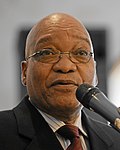Marikana massacre
The Marikana massacre[1] took place on the 16 August 2012.The incident took place on the 25th anniversary of a nationwide miners' strike.[2] The events happened in Marikana, a place in South Africa. South African police forces shot at miners, who were protesting. They injured 78 and killed 34 of them. Most of those killed were killed by rifles used by police forces. The event was the most lethal use of force by South African security forces against civilians since 1976.[3] The massacre has been compared to the 1960 Sharpeville massacre.[4][5]
The strike was considered a important event in modern South African history; similar strikes at took place at other mines across South Africa.[6] These events made 2012 the most protest-filled year in the country since the end of apartheid.[7]
The Marikana massacre occurred during a wildcat strike at a mine owned by Lonmin in the Marikana area, close to Rustenburg, in 2012. The event garnered international attention after a series of violent incidents between the police, Lonmin security, and members of the National Union of Mineworkers (NUM) on one side, and strikers on the other. The first incidents of violence were on 11 August, when NUM leaders opened fire on NUM members who were on strike. Two strikers were seriously wounded, but not killed, in the shooting by NUM members.[8]
During the period from Sunday 12 August to Tuesday 14 August, 10 people were killed, including six mine workers, two Lonmin security guards, and two SAPS members. Three of the mine workers, and the two SAPS members, were killed in a clash between strikers and SAPS members on the afternoon of 13 August. The remaining five people are known to or believed to have been killed by strikers.
Marikana Massacre Media
Average price of platinum from 1992 to 2012, in US$ per troy ounce (~$20/g)
President Jacob Zuma said he was "shocked and dismayed" by the shooting.
A commemorative banner outside the Central Methodist Mission in Cape Town.
A work of protest art in Cape Town remembers one of the casualties.
A commemorative artwork by artist Jeannette Unite
Firebrand politician Julius Malema called for a national mining strike sharing the Lonmin workers' demand for a blanket wage of R12,500.
An activist addresses striking Gold Fields mineworkers in Carletonville, Gauteng, October 2012.
References
- ↑ South Africa's ANC to discuss mine shootings row. BBC News. 27 August 2012. https://www.bbc.co.uk/news/world-africa-19388584. Retrieved 27 August 2012.
- ↑ John D. Battersby (16 August 1987). "Miners' Strike in South Africa Raises the Spirit of Resistance". The New York Times. https://www.nytimes.com/1987/08/16/weekinreview/miners-strike-in-south-africa-raises-the-spirit-of-resistance.html?pagewanted=all&src=pm. Retrieved 21 August 2012.
- ↑ "South African police open fire as striking miners charge, killing and wounding workers". The Washington Post. 16 August 2012. https://www.washingtonpost.com/business/south-african-police-open-fire-on-striking-mine-workers-several-injured/2012/08/16/c9c99e3c-e7ad-11e1-9739-eef99c5fb285_story.html. Retrieved 16 August 2012.
- ↑ Richard Stupart (16 August 2012). "The Night Before Lonmin's Explanation". African Scene. Archived from the original on 20 August 2012. Retrieved 17 August 2012.
- ↑ Monde Maoto and Natsha Marrian (17 August 2012). "BDlive". BDlive. Archived from the original on 4 August 2020. Retrieved 17 August 2012.
- ↑ "Bokoni platinum mine strike shootings" (Video). The Guardian (London). 17 October 2012. https://www.theguardian.com/world/video/2012/oct/17/south-african-miners-shot-video.
- ↑ Maeve McClenaghan (18 October 2012). "South African massacre was the tip of an iceberg". The Bureau of Investigative Journalism. Archived from the original on 19 April 2015. Retrieved 18 June 2021.
- ↑ Marikana Commission: NUM in a deep hole over the fight that started it all, by Sipho Hhlongwane, The Daily Maverick, 1 February 2013







